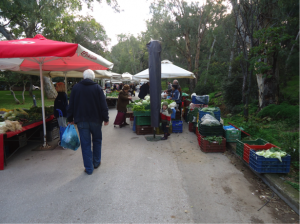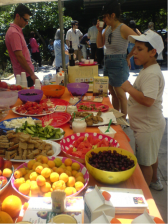Organic Farmers’ markets
May 28, 2013
Contributor: Athens
Workshop:
Governance, synergies and local systems / Final consumers – General Public – Low-income Households & multi-ethnic communities -Youngsters
Social inclusion, job creation, economics / Eating more sustainably within a limited budget – Impacts on jobs and local economy of a shift in food demand
Resource efficiency – CO2 reduction / What key behavioural changes to promote to effectively lessen footprint?
Organic Farmers’ markets offer local seasonal organic products to consumers, leading to a sustainable nutrition model at decent prices.


Organic Farmers’ markets operate in Greece since 1994, offering consumers access to local organic food at affordable prices. In these markets only organic farmers participate each selling the products he/she produces.
The markets have proved to be an effective way in motivating consumer demand for organic products, promoting healthy diet patterns, supporting organic farmers viability and promoting local organic products and sustainable agricultural practices.
The following relevant key elements characterize the organic farmers’ markets operation:
- Local products of organic farming, which forms one of the most sustainable and ecological agricultural and distribution practices.
- Producer only, a fact that brings together producers and consumers thus enforcing the urban-rural continuum and providing informal education with regards to sustainable practices.
- No waste: in the markets no waste is produced except for the non-recyclable items. Hence
(a) producers use all non-appropriate food (leftovers, degraded items. etc) for compost or animal feed and
(b) all recyclable waste is left at recycling bins provided by the municipality.
- “Love by the kilo”, a program operated by the organic farmers association in cooperation with municipal nurseries or kindergartens. The local organic market adopts a nursery or kindergarten supplying for free the required quantities of fruits, vegetables and legumes.
- “Alternative Ecoagriculture school”: year round free education on organic agriculture. The program is implemented in a farm close to Athens, which is also open to daily school visits.
Presently 28 organic farmers’ markets operate in Attiki, while none in Athens. In view of this fact, in 2012 all municipal communities in Athens were informed on the possibility of operating such markets. As a result all communities have decided unanimously to host organic markets. This year the municipal council has approved the decision for a market in Patissia, an underpriviliged area characterized by low-income population and a mosaic of civilizations. The decision implentation is pending.
The main motivation in establishing organic farmers’ markets is to provide access to healthy, local and sustainable food at affordable prices. In this way a major issue is addressed since the access to organic and healthy food in Athens is restricted.
Hosting organic farmer’s markets in Athens shall provide a good basis for changing peoples attitude towards their food and promoting sustainable food practices through the following tools:
- Educating consumers on sustainable food production and distribution.
- Provide sustainable food within a limited budget.
- Introduce organic food in kindergartens and establishing green public procurement schemes.
- Educate students and youngsters on organic agriculture and sustainable practices.
- Educate consumers on basic food waste management through the “No waste” practice, as implemented by market participants.
The expected benefits are multifaced and ranging from healthier food habits and change in consumption patterns, local economy revival through mediate or immediate job creation. At a second level local food service businesses may turn towards organic and quality products.
Pro:
The operation of an organic farmers’ market has immediate results on all the aforementioned aspects.
Contra:
Organic food is more expensive than many conventional products, so this might affect consumers in a reverse manner.
Getting into the process of establishing an organic farmers’ market.
How many of the partner cities operate organic famrers’ markets and what is their experience with regards to their social impact?